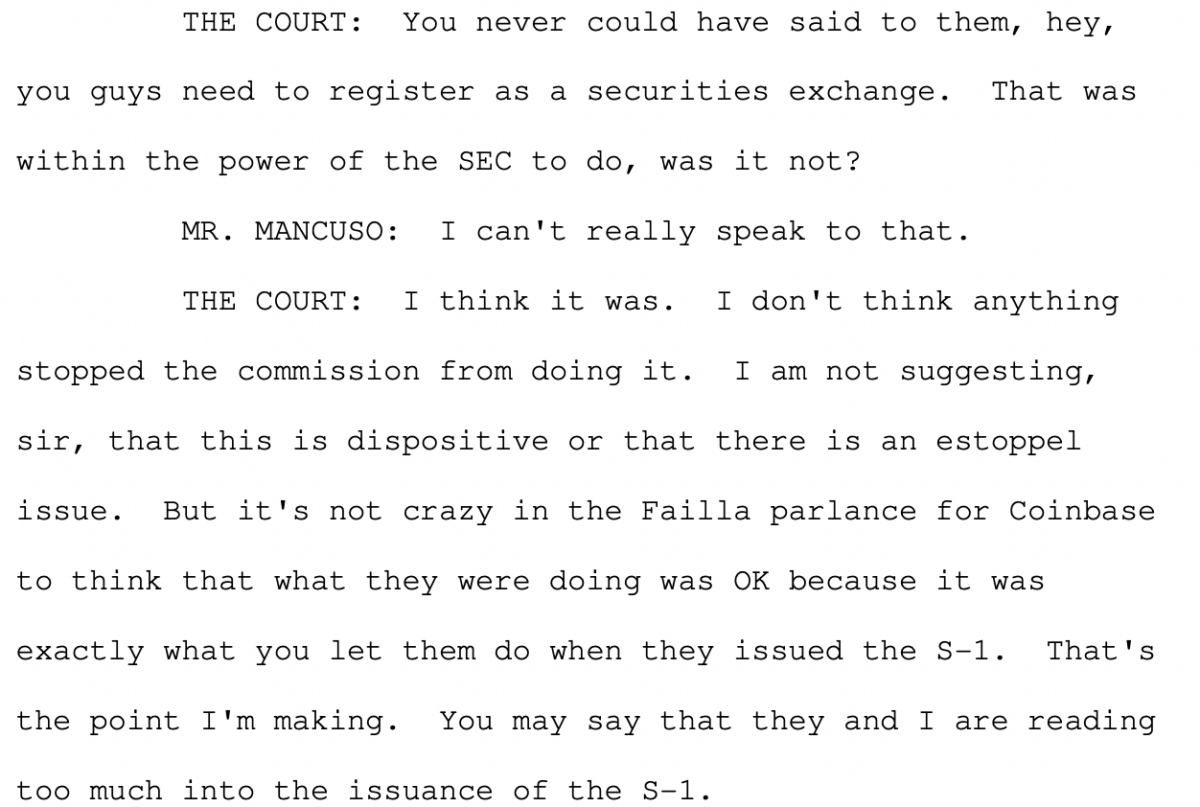In the ongoing legal confrontation between cryptocurrency exchange giant Coinbase and the US Securities and Exchange Commission (SEC), District Judge Katherine Polka Failla has raised eyebrows in the crypto community with her probing questions and comments regarding the SEC’s 2021 approval of Coinbase’s Submit S-1. The relevant exchanges in the courtroom took place during a pre-motion hearing on July 13 and focused on Coinbase’s initial public offering (IPO) in 2021.
Coinbase’s IPO, which required an effective S-1 filing with the SEC, allowed the company’s stock to go public for the first time. S-1 filings are the type of filing required by the SEC for new securities for public, US-based companies. In June, the SEC filed a civil suit against Coinbase for alleged securities law violations, though it was not a concern at the time of the IPO, a counter judge called Failla at the hearing of the case last week.
Moving the legal goalposts
In court documents revealing the conversation that took place during the hearing, Judge Failla suspected that Coinbase may have inferred their actions as admissible from the SEC’s lack of opposition during the S-1 filing process.

The SEC’s legal counsel quickly clarified, arguing that acceptance of the S-1 filing does not imply endorsement of the company’s underlying business model or operations:
“Just because the SEC allows a company to go public does not mean that the SEC is blessing the underlying company or corporate structure, or saying that the underlying corporate structure does not violate the law,” they said.
The SEC’s counsel was unable to provide evidence to confirm that the regulator had scrutinized specific assets on Coinbase’s platform or assured the cryptocurrency exchange that they would not later be deemed safe. This discrepancy in the SEC’s actions during Coinbase’s IPO process caught the attention of Judge Failla, who further suggested that the SEC’s position on the S-1 filing warranted skepticism.
According to the court, the SEC may have done well to conduct its due diligence on the company’s business practices during its review of Coinbase’s S-1. This, Judge Failla believes, could have alerted Coinbase to possible future problems in their business operations. While she didn’t expect the SEC to be “omniscient,” she expressed a belief that they should have had some foresight about potential conflicts between Coinbase’s business and securities laws.
A change in the regulatory wind?
This distinction was one that Steven Peikin, part of Coinbase’s legal team and former co-director of the SEC’s enforcement division, also pushed for. Peikin pointed to the SEC’s historical practice of not reviewing filings from industries such as cannabis and betting. Reinforcing Judge Failla’s skepticism, Peikin argued that the SEC’s approval of Coinbase’s S-1 carried more legal weight than the regulator claimed.
While the proceedings represent a small portion of the SEC’s lawsuit against the exchange, there have been few instances where court representatives empathized with crypto exchanges’ arguments or ruled in their favor. Some in the Web3 community like to see this as a sign that the position of Web3-native companies operating in the NFT and cryptosphere is less invalid than the SEC has suggested in its regulatory approach.
Editor’s Note: This article was written by an nft now contributor in collaboration with OpenAI’s GPT-4.

